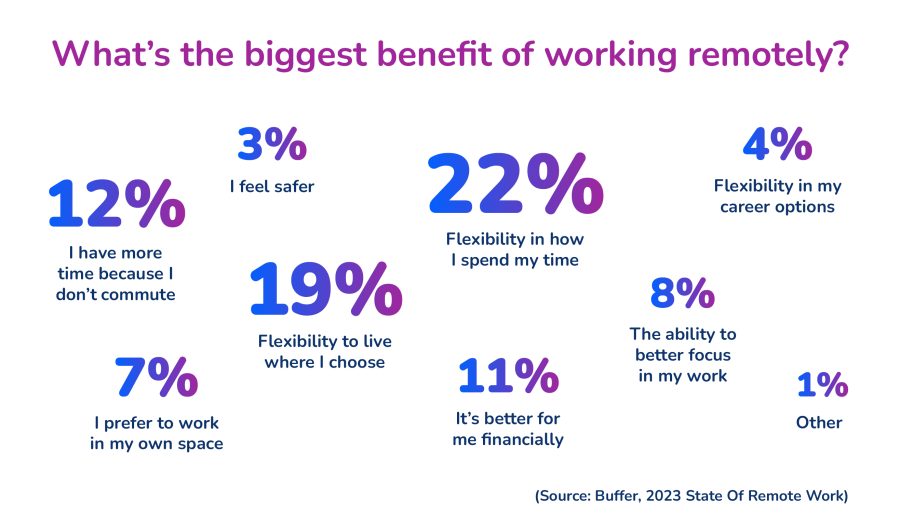Can gamification really transform remote work and help companies keep their teams motivated?

Back to Blog
The shift to remote work has transformed the way businesses work. According to Buffer’s State of Remote Work 2023 report, 98% of remote workers want to keep working remotely. They want to do this, at least partly, for the rest of their careers.
And it is easy to see why.
Employees no longer have to commute daily or follow strict office hours. They can enjoy a better work-life balance and choose to live in places that inspire them.
The benefits for companies are mutually beneficial and extensive. Business.com states that telework is a key factor in the success of business operations in today’s new reality. Organizations that embraced remote work have broadened their talent pool, found productivity increases, and improved employee retention.
Yet, despite all these benefits, there’s a challenge that often goes unnoticed until it becomes too big to ignore: keeping remote teams motivated and engaged.
When colleagues no longer share the same physical space, spontaneous conversations, shared celebrations, and daily interactions become scarce. Over time, this can lead to feelings of isolation, decreased motivation, and a weakened sense of belonging.
The good news? Companies don’t have to accept this as the new normal. By adding gamification, organizations can transform remote work from feeling disconnected into something energizing and collaborative.
Let’s explore how companies can use it to build remote cultures where employees feel recognized, connected, and inspired to do their best work, no matter where they are logged in.

Motivation and engagement in a traditional office often come from shared spaces, spontaneous chats with colleagues, shared experiences and visible progress. When teams go remote, that energy can fade. Gamification brings it back by turning everyday tasks into visible, rewarding experiences.
For instance, virtual reward systems let employees earn badges, points, or small prizes for completing projects, helping colleagues, or hitting personal goals. This isn’t about playing games instead of working, it’s about adding meaningful recognition to what people already do.
A Gallup study showed that employees who feel recognized are over twice as likely to engage at work. And in a remote setting, digital rewards are a great way to make that recognition clear and public.
This approach creates a positive feedback loop. When people see their progress and get recognition, they feel motivated to keep doing well.
Many companies seek ways to motivate remote workers and encourage healthy competition. Leaderboards and challenges are an effective solution.
Far from encouraging cutthroat competition, well-designed leaderboards encourage friendly competition. They also help celebrate top performers, and motivate others to push just a bit harder.
For remote employees, where it’s easy to feel invisible, seeing your name rise in the rankings can bring a tangible sense of belonging and achievement. A 2021 Joblist study found that 7 in 10 employees (or 70.2%) who felt unseen also felt burnt out. Those who did not feel invisible were more productive and engaged.
When balanced well, friendly competition doesn’t divide teams, it helps everyone pull in the same direction.
Gamification isn’t just about individual performance. It has the power to bring people together.
According to Buffer’s State of Remote Work report, 20% of remote workers cite loneliness as their biggest struggle. Remote work can often feel solitary, but it doesn’t have to. Organizing collaborative problem-solving, like innovation sprints, wellness competitions, or team quizzes, helps rebuild the social fabric that office life once provided.
These shared activities offer more than entertainment. They create new connections and reinforce the idea that employees aren’t working alone but are part of something bigger.
A study in the Harvard Business Review found something interesting. Remote workers who felt connected were more likely to stay motivated. In fact, they were 32% more likely to stay motivated. These activities remind remote employees that they are still part of the same team even if they work in different time zones.
New remote employees often have difficulty staying engaged during onboarding and training. However, gamification can make the process more interactive and enjoyable. By incorporating role-playing, quizzes, and riddles, you can create a dynamic learning experience that keeps employees motivated and focused.
This approach not only helps remote workers feel more confident and connected but also improves knowledge retention, which is crucial during those busy first weeks when there’s a lot to absorb. Gamified training gives new hires the tools to integrate smoothly and start contributing to the team faster.
In the end, remote work isn’t going away, and neither is the need to keep employees motivated and engaged. Gamification provides a practical, proven way to restore the sense of connection and shared purpose that teams can lose when they go remote.
By embracing gamification solutions like vaibe, companies can build remote workplaces that feel less like a series of isolated home offices and more like a truly unified team.
vaibe is a white-label gamification solution. This means you can fully integrate it with your software to create a tailored solution that meets your needs. Our solution has three main environments where the magic happens:
It’s not just about making work more enjoyable (though it often does that too). It’s about helping every employee feel motivated to give their best and to feel part of something bigger than themselves. Because when remote teams feel engaged, recognized, and inspired, great work follows. That’s a win you can celebrate virtually everywhere.
If you want to implement these strategies in your remote team, please get in touch with us!
Discover how gamification can tackle common workplace communication challenges and boost engagement.
Discover how gamification helps boost mental health, reduce stress, and build engagement at work.
Understand how to immediately start boosting business productivity with gamification tools that drive real results.
Understand how gamification boosts employee engagement by setting clear goals, rewarding accomplishments, and enhancing teamwork.